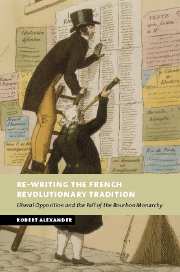 Re-Writing the French Revolutionary Tradition
Re-Writing the French Revolutionary Tradition Book contents
- Frontmatter
- Contents
- List of maps
- List of tables
- Acknowledgements
- List of abbreviations used in notes
- Map 1 The departments of France and their capitals in 1814
- Map 2 The Haute-Garonne
- Map 3 The Isère
- Map 4 The Bas-Rhin
- Map 5 The Seine-Inférieure
- Introduction: Open questions
- 1 False starts and uncertain beginnings: from the First Restoration (May 1814) to the elections of September 1816
- 2 Battle commences: from September 1816 to July 1820
- 3 Self-defeating opposition: from July 1820 to February 1824
- 4 Back on track: from March 1824 to January 1828
- 5 Towards victory?: from January 1828 to July 1830
- 6 Aftermath: Liberal Opposition and the July Revolution
- Conclusion: Revolutionary tradition
- Bibliography
- Index
- NEW STUDIES IN EUROPEAN HISTORY
3 - Self-defeating opposition: from July 1820 to February 1824
Published online by Cambridge University Press: 04 December 2009
- Frontmatter
- Contents
- List of maps
- List of tables
- Acknowledgements
- List of abbreviations used in notes
- Map 1 The departments of France and their capitals in 1814
- Map 2 The Haute-Garonne
- Map 3 The Isère
- Map 4 The Bas-Rhin
- Map 5 The Seine-Inférieure
- Introduction: Open questions
- 1 False starts and uncertain beginnings: from the First Restoration (May 1814) to the elections of September 1816
- 2 Battle commences: from September 1816 to July 1820
- 3 Self-defeating opposition: from July 1820 to February 1824
- 4 Back on track: from March 1824 to January 1828
- 5 Towards victory?: from January 1828 to July 1830
- 6 Aftermath: Liberal Opposition and the July Revolution
- Conclusion: Revolutionary tradition
- Bibliography
- Index
- NEW STUDIES IN EUROPEAN HISTORY
Summary
FAILED REVOLUTION FOSTERS REACTION
With the advantage of hindsight, one can characterize the second Richelieu ministry as essentially transitional in nature as power flowed from the Centre-Right to the Right. Such a perspective was not, of course, necessarily apparent to contemporaries, but for our purposes the main points of interest of the period lie in how this transition was brought about. In particular, the role of Joseph de Villèle in bringing ultraroyalism to power and the ways in which the Liberal Opposition unwittingly facilitated Villèle's triumph merit careful consideration.
Departmental colleges greatly fortified the Right in the elections of November 1820, but the Left also performed poorly in arrondissement colleges, partly because some 14,500 voters had been removed from the electorate by lowering of the basic land tax. Liberals were reduced to roughly 80 Deputies, the Centre-Right rose to 190, and the main beneficiaries were ultraroyalists, whose numbers increased to 160.
Richelieu therefore had to accommodate ultraroyalism, and Villèle and his ally Count Jacques-Joseph de Corbière, a Deputy of the Ille-et-Vilaine known for his sharp debating skills, entered the cabinet as Ministers without Portfolio in December. Collaboration with the Centre-Right, however, left Villèle open to criticism from extreme ultraroyalists who raised difficulties before granting a three-month extension to censorship. While it was aimed principally at the Left, censorship also constrained ultraroyalist vituperation.
- Type
- Chapter
- Information
- Re-Writing the French Revolutionary TraditionLiberal Opposition and the Fall of the Bourbon Monarchy, pp. 135 - 186Publisher: Cambridge University PressPrint publication year: 2003


